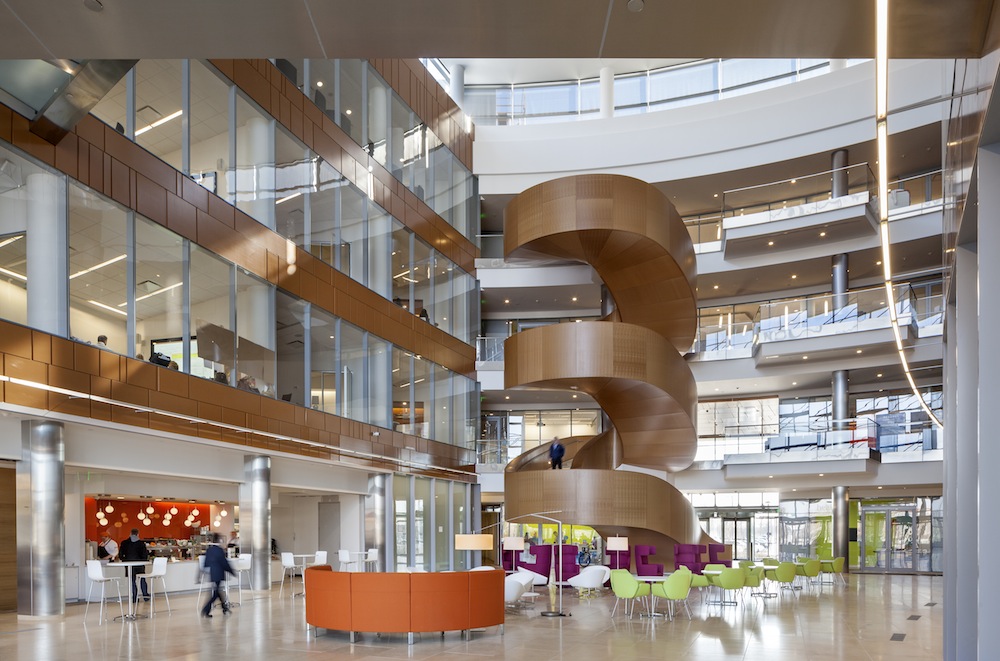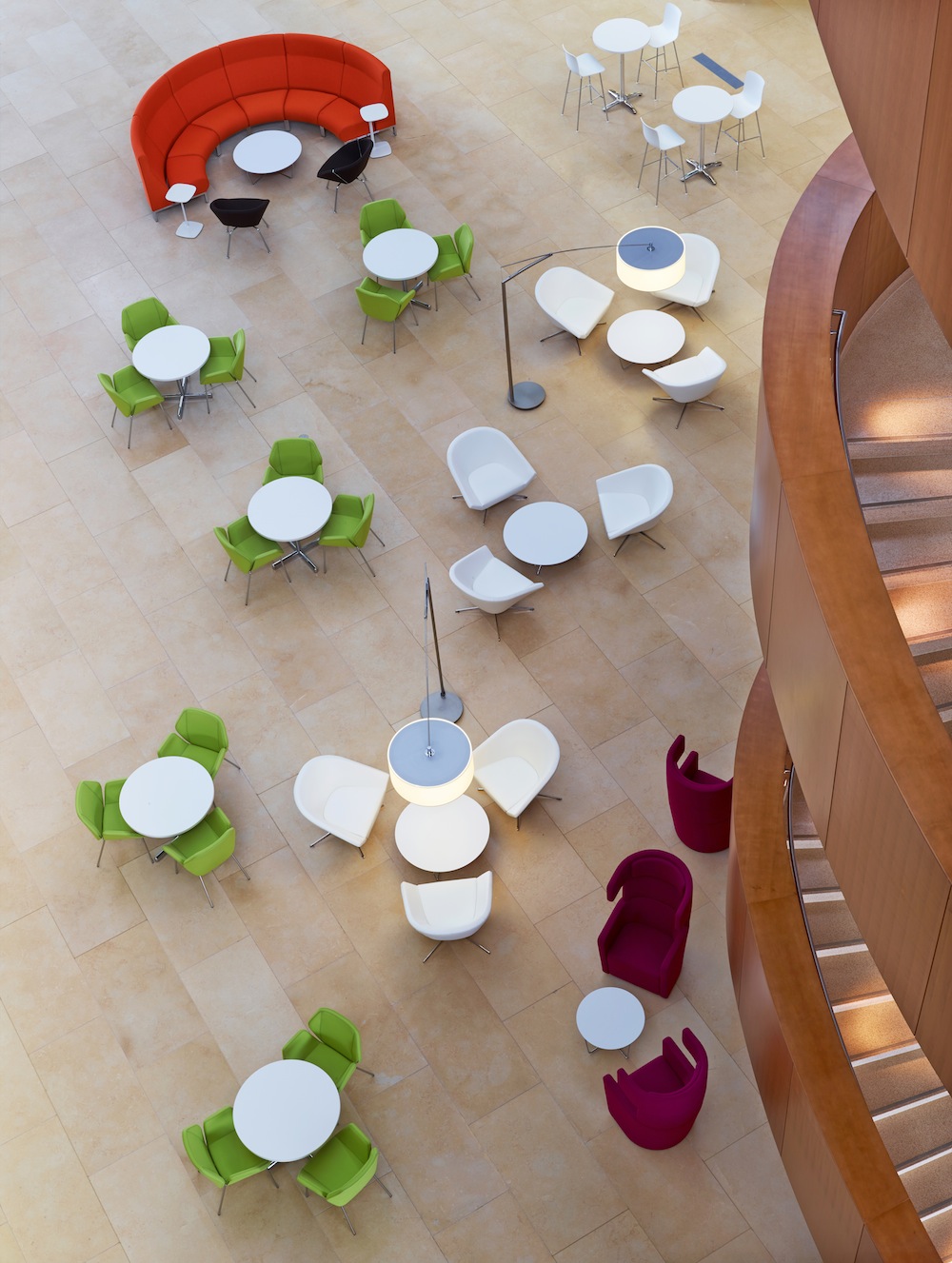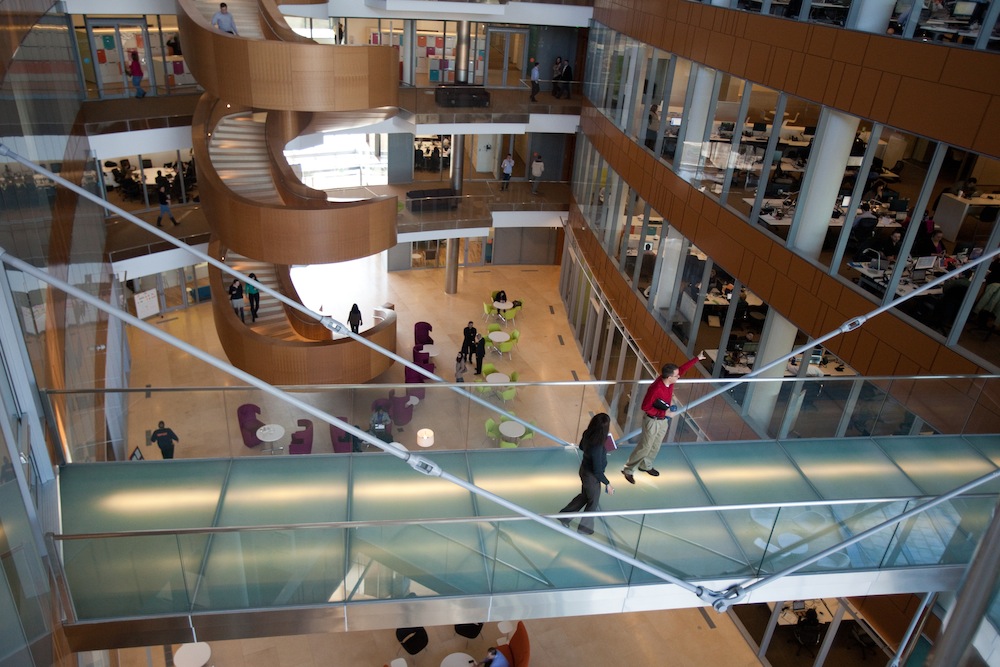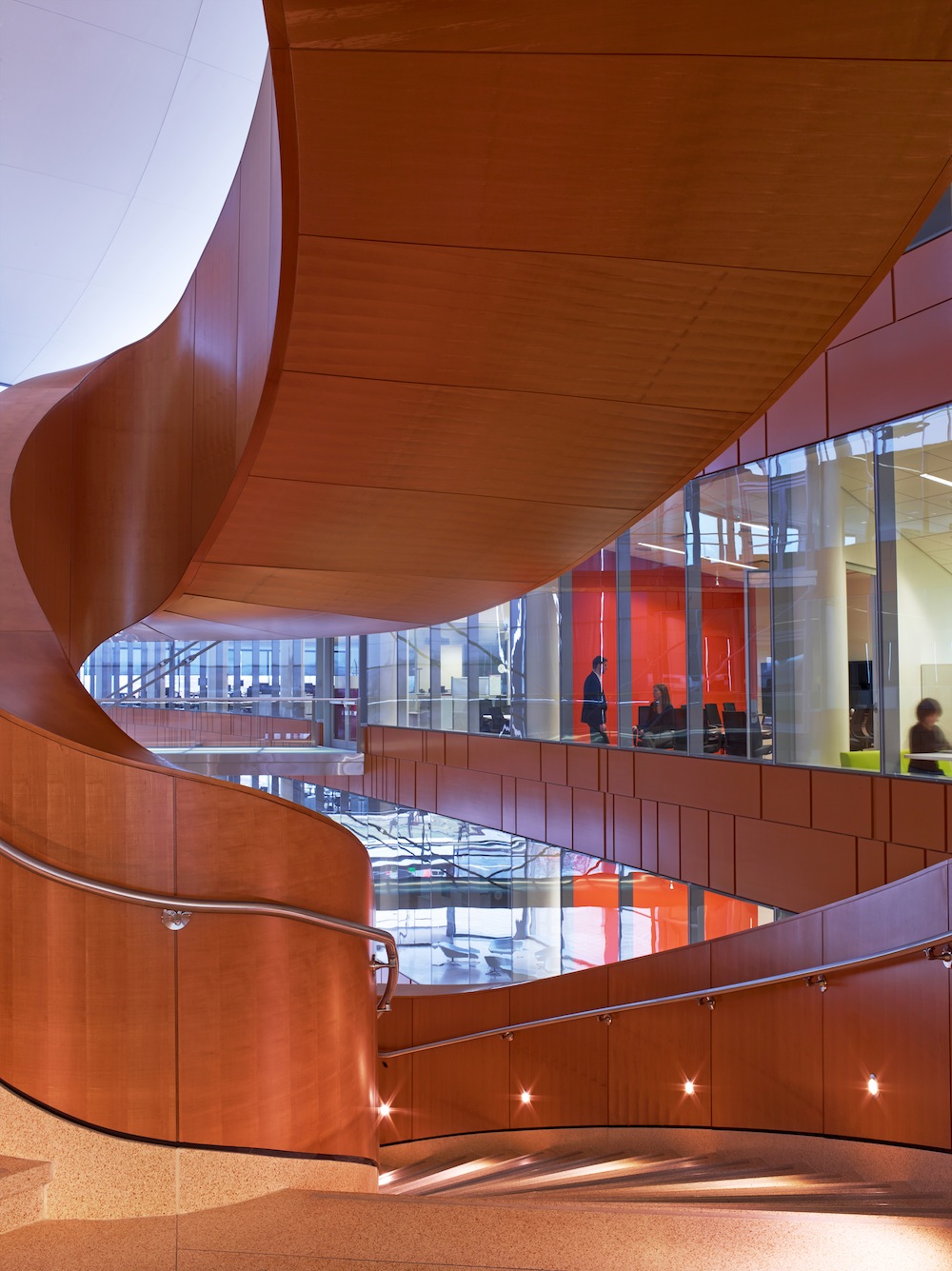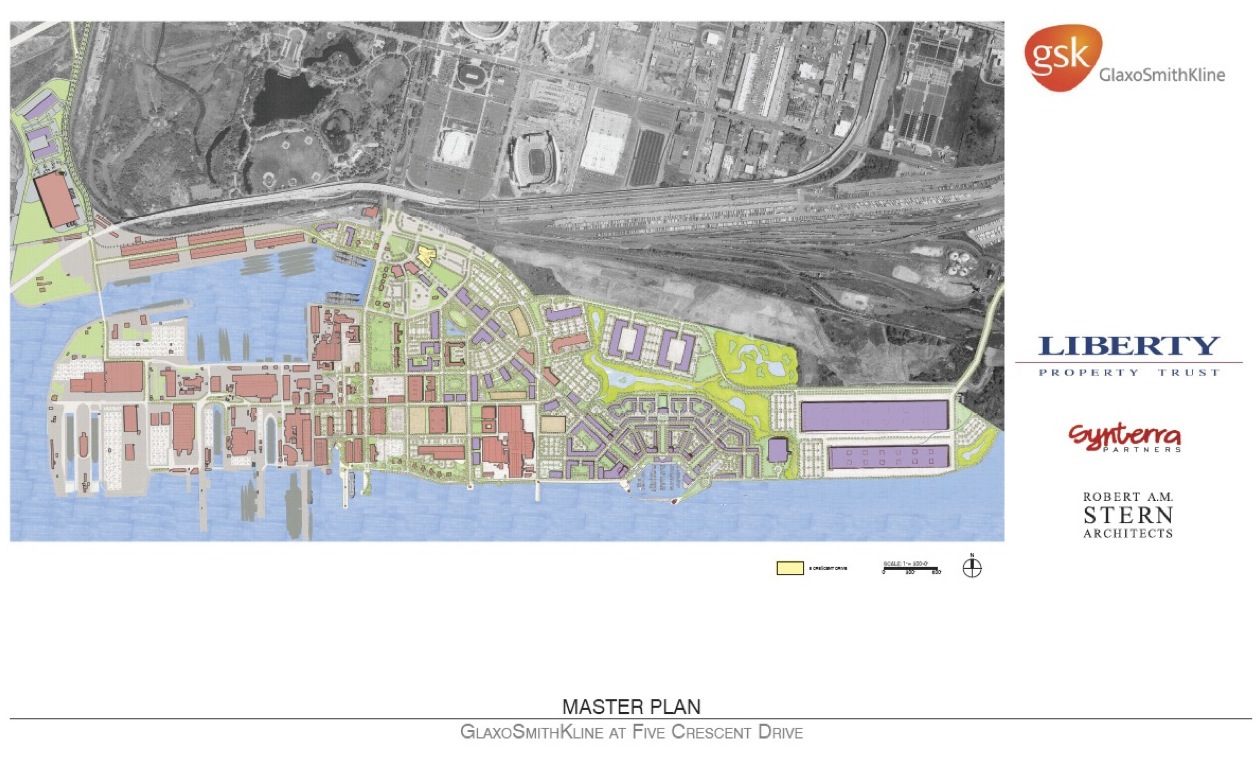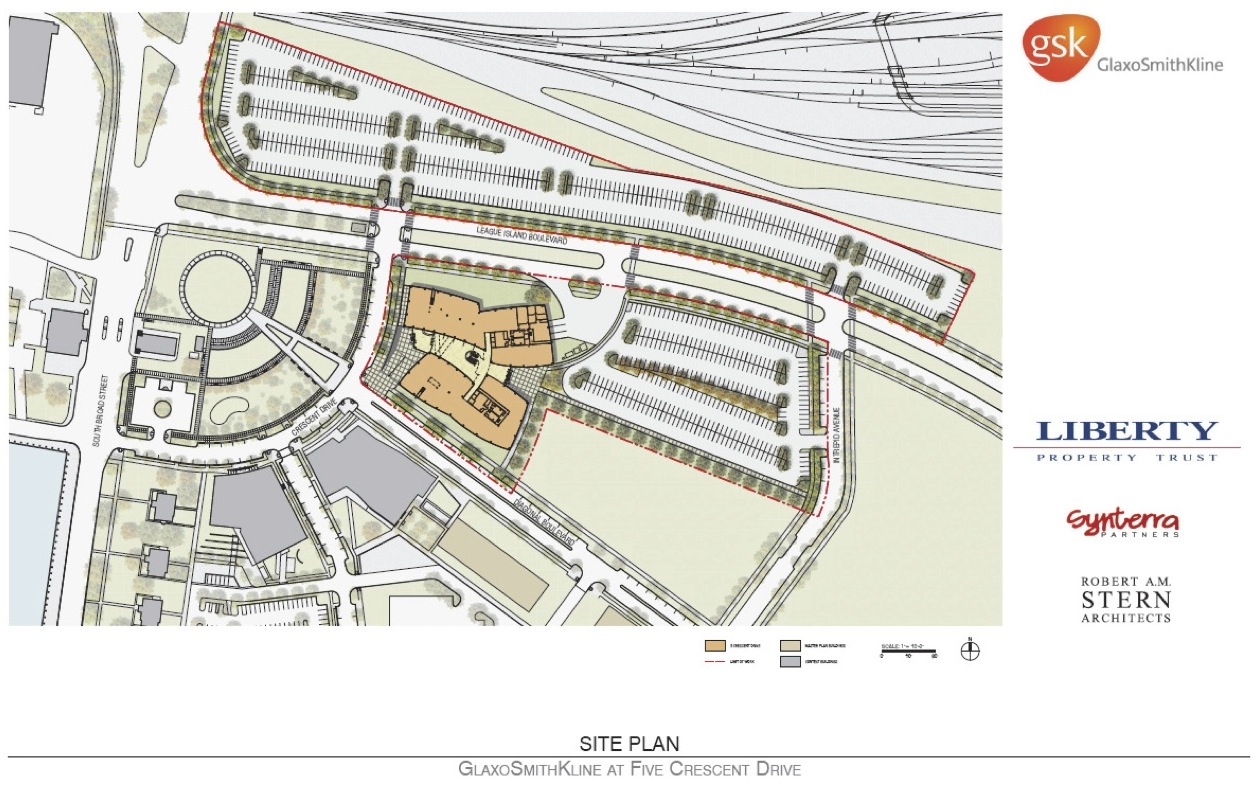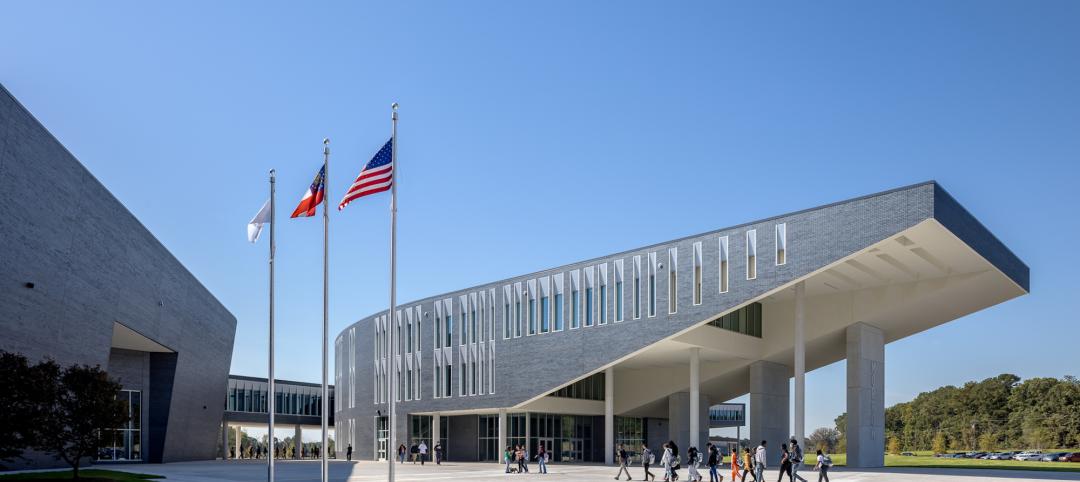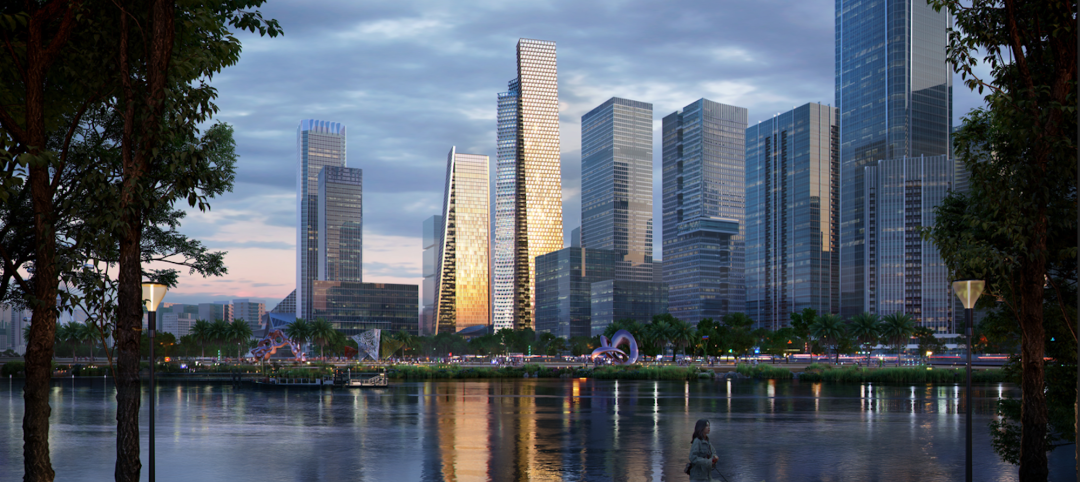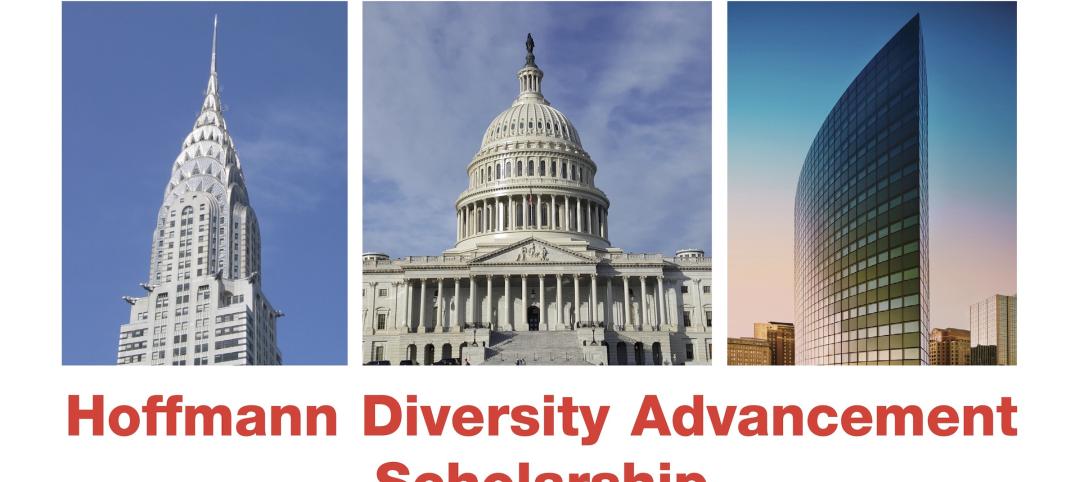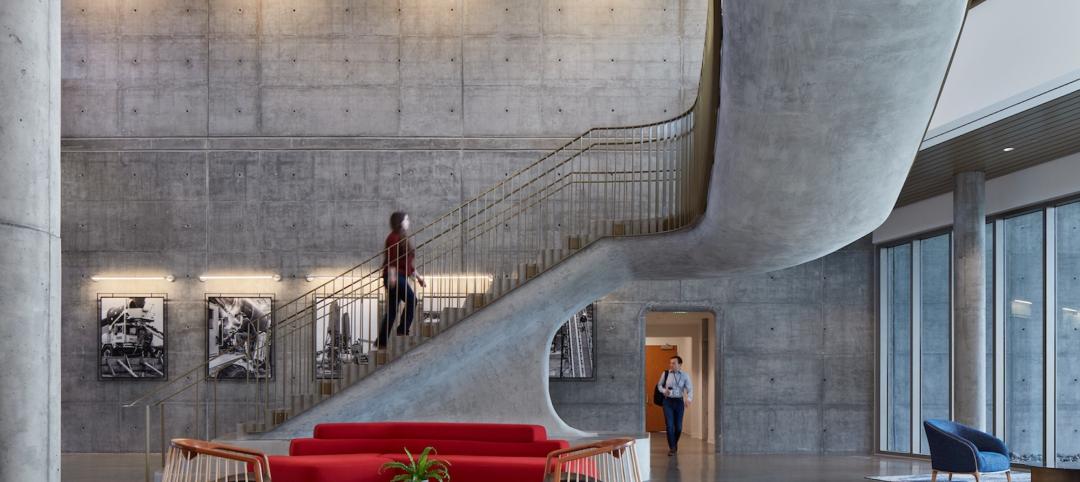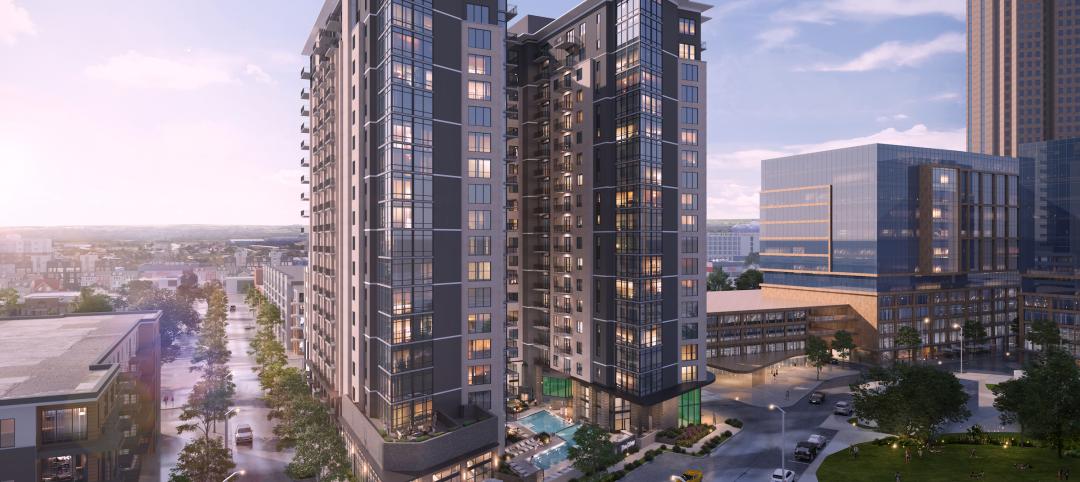GlaxoSmithKline officially opened its new double LEED Platinum certified facility in Philadelphia’s Navy Yard Corporate Center earlier today, ushering in a new era of how people work in Philadelphia. Employees, families and friends celebrated a ribbon-cutting ceremony with GSK President of North America Pharmaceuticals Deirdre Connelly, Liberty Property Trust Chief Executive Officer Bill Hankowsky, Synterra Partners Principal Bill Wilson, design architect Robert A.M. Stern, workplace strategist and interior architect Francis Cauffman Principal John Campbell and Philadelphia Mayor Michael A. Nutter.
“Our new work space is designed to inspire and connect people,” says Deirdre Connelly, President, North America Pharmaceuticals, GSK. “My teammates and I are energized by this new environment, where we can do our best work and collaborate without the constraints of office walls.”
The 208,000 square foot building at Five Crescent Drive represents an $80 million investment by Liberty Property/Synterra, and an investment of approximately $70 million by GSK. GSK has signed a 15.5-year lease at the building, which includes a four-story central atrium, a monumental stairway, a coffee shop, cafeteria, fitness center, meeting centers and a large multi-purpose room.
“GSK’s new facility reflects the reality of The Navy Yard: it is a Philadelphia magnet for creative, forward-looking companies,” said Bill Hankowsky, Chief Executive Officer, Liberty Property Trust. “Innovation and growth are now synonymous with this dynamic environment.”
Photo: Francis Dzikowski / Esto for Robert A.M. Stern Architects, LLP
The four-story, glass-encased building with an open floor plan and grand central staircase has been awarded both Core & Shell™ and Commercial Interiors™ LEED® Platinum certification from the U.S. Green Building Council. It is the first double LEED® Platinum building in Philadelphia. It is anticipated that the innovative building systems will save as much as 30% of energy use when compared to a traditional building.
These substantial energy savings are the result of the state-of-the-art building façade and high-performance glass which maximize daylight in winter while reducing heat gain and providing shading in summer. ENERGY STAR-rated lighting and equipment, as well as an astronomical time clock and cloud sensor program, activate the automatic shades on windows to control glare. In addition smart meters track and monitor the building’s energy and water use and provide ongoing accountability for utility consumption and performance.
Photo: Francis Dzikowski / Esto for Robert A.M. Stern Architects, LLP
“It was GSK’s commitment to Philadelphia that put The Navy Yard well over the 10,000 employee mark,” said Mayor Michael A. Nutter. “Just 18 months ago we stood here to break ground on this project, and I am thrilled to be here today to celebrate the grand opening of one of the most innovative, healthy, and green work spaces in the US.
Sweeping views of Philadelphia are accessible from nearly 90% of the workspaces. In the office-less layout, employees are located in “neighborhoods” and can work in a variety of settings throughout the day. These include custom-designed sit-to-stand workstations, team tables, meeting areas, social areas with soft seating, and quiet rooms.
“Francis Cauffman is very excited to see employees working and interacting throughout the entire building, and to hear the highly positive employee response to their new workplace,” said John B. Campbell, LEED AP, AIA, RIBA, Principal-in-Charge of Workplace Strategies at Francis Cauffman. “By creating an open and healthy workplace environment focused on providing the right physical and IT tools with a wide variety of work settings throughout the building, the new workplace has transformed the level of energy, engagement and connectivity across the organization.”
Photo: Eric Laignel for Francis Cauffman
Daily service to and from Center City via The Navy Yard Express Shuttle along with plentiful parking and key amenities, such as parks with Wi-Fi access and recreational activities and the soon-to-be-completed Courtyard by Marriott, a flagship property with an upscale bar and restaurant, attract employees to a unique and vibrant setting.
Innovation and sustainability from top to bottom
Whether one starts on the top of the building, which offers a green rooftop, or at the front door apron which features Five Standards (Dazzle), a Mural Arts Program commissioned piece of public art by Virgil Marti, GlaxoSmithKline at The Navy Yard delivers excitement and energy. The five 16’ x 7’ foot steel and mirror polished stainless steel sculptures resemble looking glasses; their design fitting seamlessly along the GSK facade, which appears as a large transparent ship docked at Five Crescent Drive.
The roof is covered 40% with vegetation and an herb garden provides many benefits including: reducing energy costs by providing natural insulation; absorbing storm water reducing the burden on the public storm water system; offering a beautiful space for events and meetings; and providing additional workspace for employees. High-efficiency, low-flow plumbing fixtures are expected to reduce water use by as much as 50% as compared to a traditional building, which will save an estimated 1.8 million gallons of water per year.?
The building’s ventilation system provides 30% more fresh air than required by code and monitored by carbon dioxide sensors installed at high-density spaces which increase the amount of fresh air in those spaces as carbon dioxide levels increase. The GSK facility and its grounds have been designated as a non-smoking site.?
For more about the building, visit http://us.gsk.com/html/media-news/navy-yard-press-kit.html.
Photo: Francis Dzikowski / Esto for Robert A.M. Stern Architects, LLP
Photo: Francis Dzikowski / Esto for Robert A.M. Stern Architects, LLP
Photo: Eric Laignel for Francis Cauffman
Photo: Eric Laignel for Francis Cauffman
Related Stories
K-12 Schools | Feb 18, 2023
Atlanta suburb opens $85 million serpentine-shaped high school designed by Perkins&Will
In Ellenwood, Ga., a southeast suburb of Atlanta, Perkins and Will has partnered with Clayton County Public Schools and MEJA Construction to create a $85 million secondary school. Morrow High School, which opened in fall 2022, serves more than 2,200 students in Clayton County, a community with students from over 30 countries.
Museums | Feb 17, 2023
First Americans Museum uses design metaphors of natural elements to honor native worldview
First Americans Museum (FAM) in Oklahoma City honors the 39 tribes in Oklahoma today, reflecting their history through design metaphors of nature’s elements of earth, wind, water, and fire. The design concept includes multiple circles suggested by arcs, reflecting the native tradition of a circular worldview that encompasses the cycle of life, the seasons, and the rotation of the earth.
Architects | Feb 17, 2023
Architect of the Capitol fired by President Biden after strong bipartisan criticism
Architect of the Capitol J. Brett Blanton was let go this week following alleged abuse of authority, misuse of government property, and wasted taxpayer money.
High-rise Construction | Feb 15, 2023
Bjarke Ingels' 'leaning towers' concept wins Qianhai Prisma Towers design competition
A pair of sloped high-rises—a 300-meter residential tower and a 250-meter office tower—highlight the Qianhai Prisma Towers development in Qianhai, Shenzhen, China. BIG recently won the design competition for the project.
Senior Living Design | Feb 15, 2023
Passive House affordable senior housing project opens in Boston
Work on Phase Three C of The Anne M. Lynch Homes at Old Colony, a 55-apartment midrise building in Boston that stands out for its use of Passive House design principles, was recently completed. Designed by The Architectural Team (TAT), the four-story structure was informed throughout by Passive House principles and standards.
Designers | Feb 13, 2023
Hoffmann Architects + Engineers Establishes Diversity Advancement Scholarship Fund
Hoffmann Architects + Engineers, a design firm specializing in the rehabilitation of building exteriors, contributed $25,000 to fund the Hoffmann Diversity Advancement Scholarship, administered through the Connecticut Architecture Foundation. The fund provides scholarships for students from underrepresented racial or ethnic groups who are seeking degrees in architecture or engineering.
Office Buildings | Feb 12, 2023
Smyrna Ready Mix’s new office HQ mimics the patterns in the company’s onsite stone quarry
Designed by EOA Architects to showcase various concrete processes and applications, Smyrna Ready Mix's new office headquarters features vertical layering that mimics the patterns in the company’s stone quarry, located on the opposite end of the campus site. The building’s glass and concrete bands are meant to mirror the quarry’s natural contours and striations.
Multifamily Housing | Feb 11, 2023
8 Gold and Platinum multifamily projects from the NAHB's BALA Awards
This year's top BALA multifamily winners showcase leading design trends, judged by eight industry professionals from across the country.
Multifamily Housing | Feb 10, 2023
Dallas to get a 19-story, 351-unit residential high-rise
In Dallas, work has begun on a new multifamily high-rise called The Oliver. The 19-story, 351-unit apartment building will be located within The Central, a 27-acre mixed-use development near the Knox/Henderson neighborhood north of downtown Dallas.
Sustainability | Feb 9, 2023
New guide for planning, designing, and operating onsite water reuse systems
The Pacific Institute, a global nonpartisan water think tank, has released guidance for developers to plan, design, and operate onsite water reuse systems. The Guide for Developing Onsite Water Systems to Support Regional Water Resilience advances circular, localized approaches to managing water that reduce a site’s water footprint, improve its resilience to water shortage or other disruptions, and provide benefits for local communities and regional water systems.


